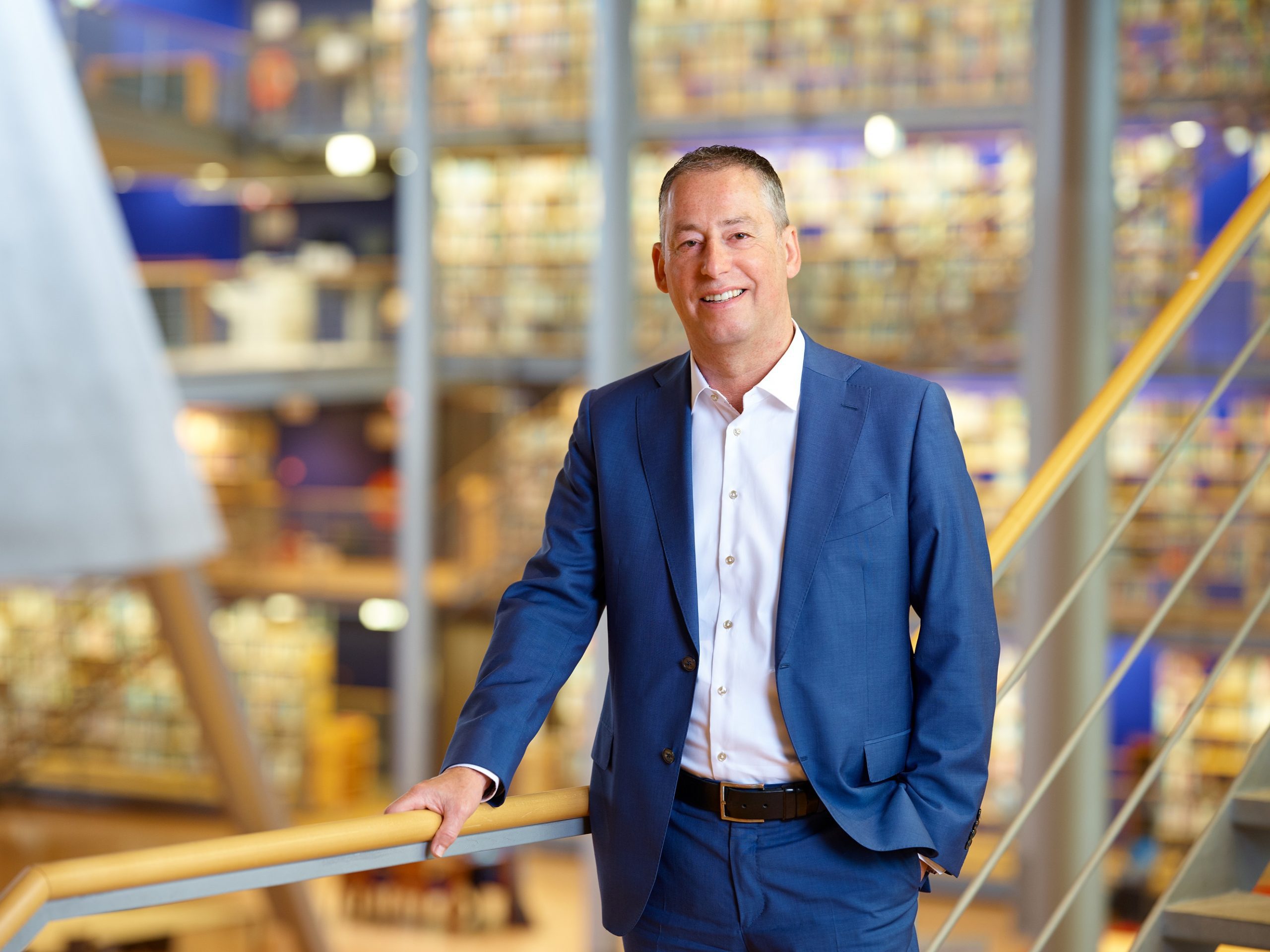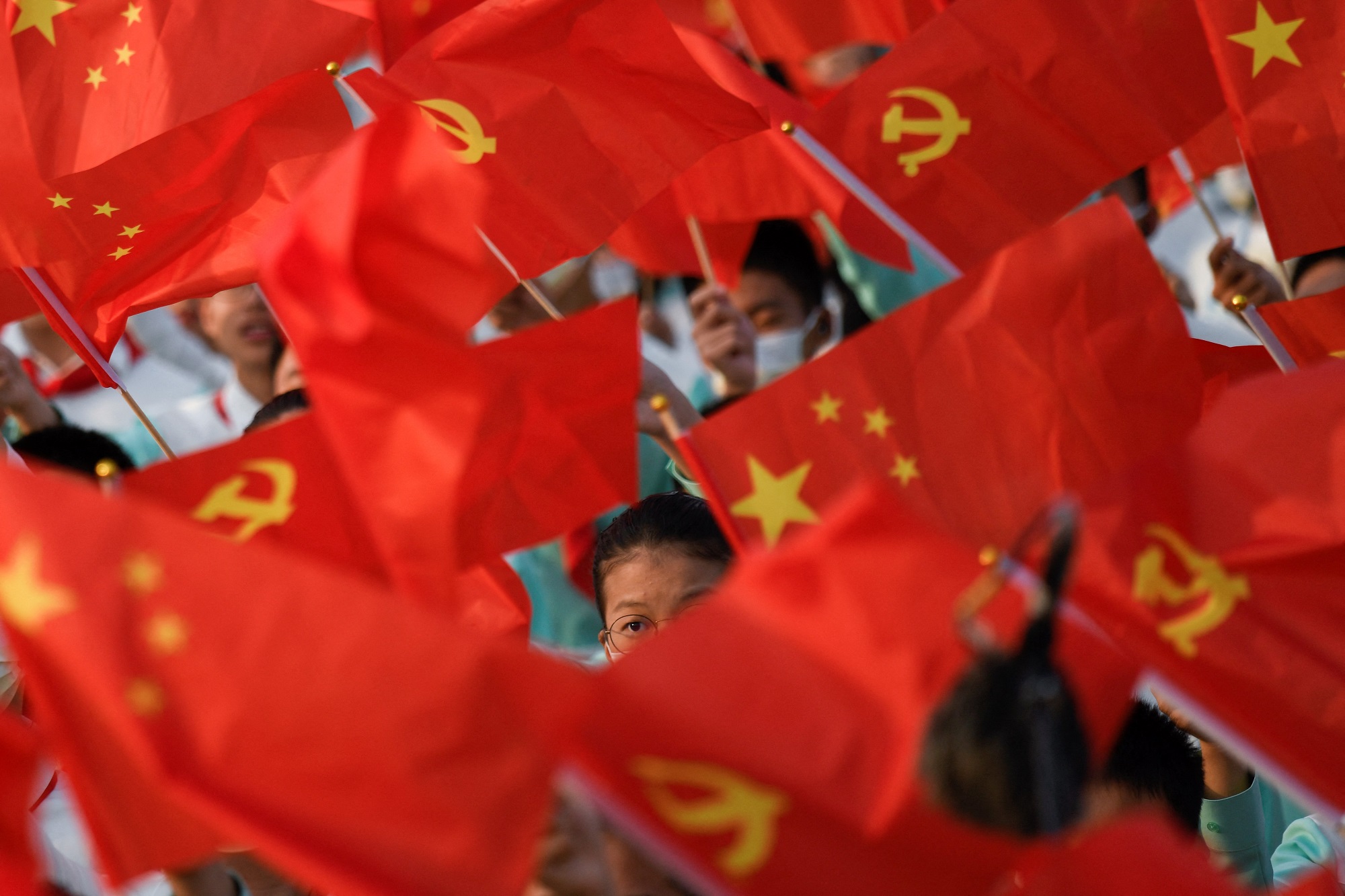New TU Delft guidelines should help academics who want to cooperate with China. Rector Tim van der Hagen calls cooperation with China a ‘wicked problem’.
Students waving flags for the celebration of the 100th anniversary of the Communist Party in Beijing. (Photo: Wang Zhao/AFP)
China is an outstanding scientific power, making the country a popular partner. In the Netherlands, TU Delft, along with the University of Amsterdam and the Utrecht University, leads the way in scientific collaboration with China. Rector Tim van der Hagen explains the history. “A few years ago, China was where everything was happening. It was making large scientific gains, coming up with major scientific innovations and was very creative in the sciences. However, questions have also arisen.” Over the years governments, think tanks and security services have repeatedly warned about knowledge transfer and espionage. In March of this year, Delta revealed that knowledge acquired at TU Delft may have ended up in the hands of the Chinese army.
Guidelines
In 2019, TU Delft hired a Policy Advisor for China and in 2020 it set up the Greater China Team whose members include representatives of the eight faculties and the Policy Advisor, Peter Gill. And recently another body was established: the Strategic Response Team Knowledge Security & International Partnership to assess the future of international partnerships in terms of knowledge security.
‘We intend to evaluate and adapt the guidelines’
Are there any initial tangible outcomes? An internal China symposium, held in April for the first time; a SharePoint site where TU Delft academics can find information about several subjects including collaboration with China; and guidelines that should help academics struggling with the question of whether they should work with colleagues, institutions or research labs from China. The manual describes: how to assess the background of a potential partner; the dos and don’ts of receiving a Chinese delegation; how China deals with intellectual property rights; and how to evaluate ongoing partnerships.
Delta discussed the guidelines – called Partner with China – Concrete Tools for TU Delft in full – with Tim van der Hagen and Policy Advisor China Peter Gill. Van der Hagen said that “It is not a finalised document that says this is the situation and this is what you do. Instead, we intend to evaluate and adapt the guidelines as we move forward. This subject is not only under consideration at TU Delft, but in the Netherlands, China, Europe and worldwide too.”
Why do you believe we need the guidelines?
Van der Hagen: “Collaboration with China is an important and comprehensive issue that affects us all in terms of education, research and valorisation. Academics are now starting to realise that we do have an issue and that something may be amiss in certain issues such as dual use, for example. You could of course say that anyone reading the newspapers would be aware of the situation, but scientists are often so wrapped up in their research that they do not look that closely at what is happening outside. The guidelines are thus not only intended to help scientists, but also to raise awareness about the risks of partnering China.”
How will you update the China Tools?
Gill explains: “We collected feedback over the last few months, for example in the symposium for academics who work with China and through discussions with deans and faculties. We are keeping the feedback in mind and will hold even more discussions. We will revisit the tools in September or October, a half year after they were adopted by the Executive Board. The plan is to thereafter do this every six months. We will look at what is outdated and where the tools can be added to.”
Van der Hagen adds: “We are always open to improvement. Not only from within TU Delft, but also from outside. I always say to the Dutch Government and ministries that it would really help us enormously if they suggest a framework. This could cover how you handle collaboration with China and in which fields and with which companies you need to exercise caution. We need this badly.”
You are in discussion with the Government about the risks of academic cooperation with China. Last year the Rijksdienst voor Ondernemend Nederland (Netherlands Enterprise Agency, RVO) issued a report (in Dutch) which listed the fields of concern to the Government. Is that not enough?
Van der Hagen: “Those discussions remain at the level of ‘exercise caution, we are concerned about the themes of knowledge security, cyber security, dual use and human rights’. We need more than this to act. We would prefer more concrete information such as a Dutch Government’s website stating what we may and may not do, and which subjects you need to seek advice for. This would be much clearer for our people.”
The TU Delft guidelines are very practical aids for academics, but they do not address when you say yes or no to a partnership while this is exactly where academics struggle. As a university should you not issue clear statements about this?
Van der Hagen: “We do not always have an answer to what we can and cannot do. The considerations are not black and white. If only they were that simple. It is thus of great importance that we enter into debate at TU Delft and learn what decisions we need to take along the way. We all see that this really is a wicked problem.”
‘A faculty may decide for itself whether to reject PhD’s from other universities’
Can you not draw a line at the Chinese army?
“That line is not as clear as you would think,” says Van der Hagen. “Imagine a scenario in which we are approached by the Chinese army to develop night vision equipment. You know immediately that it would be used to shoot people in the dark. You should not do this type of research. However, the shady side of research is not always that clear. Take satellite technology, for example. You could work on it jointly to observe the climate. That knowledge would benefit humanity. But China could also use that satellite technology for espionage. Should you then say no to that sort of research? That would depend on who you would work with in the army and what their intentions are. There is a large grey area in which you develop knowledge that is positive, but could also be used in other areas.
 Rector Tim van der Hagen: “We should avoid quickly falling behind and being unable to catch up.” (Photo: Jeroen Bouman).
Rector Tim van der Hagen: “We should avoid quickly falling behind and being unable to catch up.” (Photo: Jeroen Bouman).
The faculty of Aerospace Engineering has said that it will not accept PhD’s from the National University of Defense Technology (NUDT), a university that serves the People’s Liberation Army. Why can this not be university wide?
Gill : “Awareness about the NUDT has increased dramatically at TU Delft recently. When NUDT candidates now apply, the rule is to first do a screening. The potential supervisor can check on Baidu Xueshu [the Chinese equivalent of Google Scholar in Chinese characters, Eds.] what type of research the person has done to date. A while ago, there was a case where there was a clear link to military purposes. The faculty in question simply said no. This is the type of awareness that a university wants.”
Van der Hagen: “You would be closer to undesirable applications in the field of Aerospace Engineering than in the faculty of Architecture and the Built Environment, for example. Each faculty may decide for itself whether to reject PhD’s from another university. At a certain point, TU Delft may decide to do something similar, but we have not yet discussed this TU Delft wide.”
‘TU Delft cannot push the whole world down the right path’
In an RVO investigation (in Dutch) last year, several knowledge institutions said that the fact that knowledge could be misused is of lesser importance than the societal impact that it could reach with China. What is your view on this?
Van der Hagen: “Of lesser importance? No. We strive for open science. We are there for everything and everyone and as a university, we want to make society better. In doing so we are not bound to political and geographic boundaries. But we cannot shrug our shoulders and ignore the shady side of technologies. I believe that it is our duty to think about this. This is why TU Delft now has ethicists when writing research proposals in the area or robotics or AI, for example. We should also not be too naive. TU Delft cannot push the whole world down the right path. There will always be things that we would like to see being done differently. All we can do is do our best. And we need to be alert.”
The tools clearly describe how you carry out research into the background of potential partners, for example by checking the financial picture of their employers and checking information on Chinese websites as far as possible. Do scientists have the time to do this?
Van der Hagen: “An overfull diary does not clear academics of their duty to think about whether the technology, data or methods that they develop could be misused.”
Gill: “Financial checks are not their expertise to be honest, so the guidelines categorically state that the academics can seek help from the departments of contract management, finance or legal, or from the China representative at their own faculty.”
Do these departments have enough knowledge and awareness of the risks of collaboration with China?
Gill” “More knowledge needs to be acquired there too, and we will start working on this soon. The China Tools were compiled by several working groups at TU Delft. A few employees at legal and contract management also worked on them.”
‘Europe has to step up to the plate’
Academics often enter into multi-year partnerships and in the meantime, China’s policy around international scientific collaboration may change, which may have an impact on Chinese scientists. How can academics keep tabs on the situation?
Gill: “In terms of new partnerships, you can include a clause in the contract in which you retain the right to end the cooperation early. This is the norm in other industries and can be adopted here too.”
Van der Hagen: “If you are concentrating on your research, you do not keep stopping to check the evaluation part of the guidelines. I understand that. So we need to find a way to look back and evaluate every so often.”
Earlier you said that you hoped the Netherlands would come up with more concrete guidelines. What do you expect from Europe?
Van der Hagen: “Now that partnerships with China are being viewed more negatively, Europe has to step up to the plate. China is very strong in the fields of radar technology, telecommunications, AI and quantum computing. It is investing heavily in all these areas. Should we not be able to take collaboration with China in these fields for granted, Europe will have to invest heavily here too. This would avoid quickly falling behind and being unable to catch up.”
Do you have a question or comment about this article?
a.m.debruijn@tudelft.nl


Comments are closed.